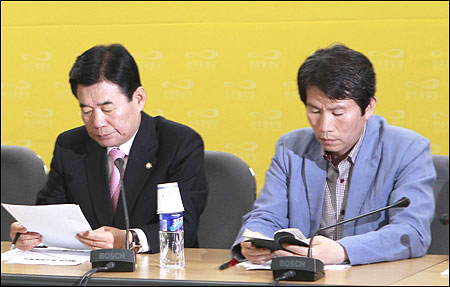Moderate voters: cure or curse?

Lee In-young, right, a lawmaker-elect of the main opposition Democratic United Party (DUP), reads a booklet during a meeting with senior DUP members Friday at its headquarters in Seoul. Next to him is Rep. Kim Jin-pyo.
A lawmaker-elect of the main opposition Democratic United Party (DUP) strove to put a halt to the full-blown debate calling for embracing middle-of-the-road voters ahead of the presidential election slated for December, Friday.
There have been growing calls from within that the party needs to woo the hearts and minds of moderate voters, as the recent parliamentary elections showed the DUP underperformed because of its leftist initiatives.
During a meeting with senior DUP members, Lee In-young, a Supreme Council member, dismissed this by characterizing the debate as a curse for the liberal party.
“The ongoing debate is meaningless and has no concrete elements,” Lee said. “If the DUP leadership takes no measures on it, this will not only complicate things for the party, but also confuse its future course of action.”
Moon Jae-in, a lawmaker-elect and potential presidential contender, disagreed.
On Thursday, he told reporters he was convinced that the DUP needs middle–of-the-road voters to win the presidential poll.
“The DUP will have to attract moderate voters to win the presidential race. Their support will be necessary for the party when seeking change,” he said.
After winning the Sasang election in the southern port city of Busan, the conservatives’ home turf, Moon, former presidential chief of staff under the late former Roh Moo-hyun government, is poised to vie for the presidential ticket.
Like other countries, moderate voters take the lion’s share of demographics here. Depending on the survey, 35 to 40 percent of eligible voters describe themselves as moderates. Gaining their support holds the key to winning elections.
The moderate-voters debate was prompted after the April 11 National Assembly elections by a group of DUP members, including Reps. Kim Jin-pyo and Park Jie-won, who belong to a minority faction.
They are set to use the debate as an ideological weapon to attack mainstream figures and gain the upper hand in the competition to select a new party leadership.
The senior members claimed the liberals had gone too far in terms of their stance on major initiatives. This included attacking the free trade pact signed with the United States during campaigning, adding the leadership was responsible for the DUP underperforming in the elections.
A backlash against leaders that oversaw the selection of candidates to run in the April 11 elections on the DUP ticket was behind their raising their voices against the party platform.
Aides of the late President Roh and a group of hardliners controlled the leadership and flexed their muscles in the selections, leaving other factions, including followers of the late President Kim Dae-jung, powerless.
The minor factions teamed up to fire back at the leadership consisting of mainstream figures calling on it to take responsibility for the election results.
The DUP garnered 127 parliamentary seats out of the 300-member National Assembly. The results are not bad, given previous election score sheets.
But criticism of the DUP was unavoidable as there were plenty of scandals and corruption cases involving President Lee Myung-bak’s aides and relatives and the ruling Saenuri Party’s vote-buying scandal before the elections.
The main opposition could have gained more parliamentary seats had it been on the right campaign track because the election landscape was in favor of the liberal party, critics said.
Former DUP Chairwoman Han Myeong-sook has stepped down to take responsibility for the election results. <Korea Times/Kang Hyun-kyung>





















































